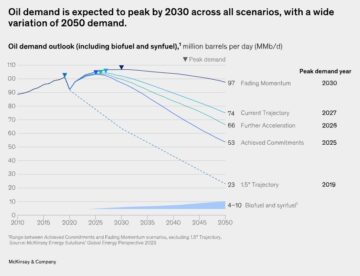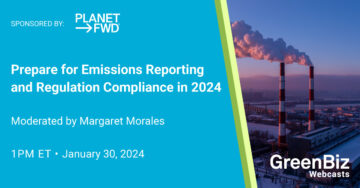
As the aviation industry searches for ways to fly net-zero planes, corporations are seeking ways to reduce, or offset, the carbon footprint of their business travel.
Boston Consulting Group is the latest company to reach for sustainable aviation fuel (SAF) certificates, which it hopes will boost demand for lower-carbon sources and reduce the effects of its jetsetting employees’ emissions in the process.
The firm announced on May 7 that it would buy SAF certificates equivalent to more than half of its carbon emissions from employee air travel in 2023. The five-year contract with World Energy will deliver CO2 emissions reductions of 100,000 metric tons, about as many as it takes to fly “177,000 economy-class passengers round trip between Boston and London,” according to BCG.
The move is part of an April 17 announcement of a $200 million group deal involving BCG, Netflix, Meta and a dozen other companies to purchase SAF certificates. Led by the nonprofit Sustainable Aviation Buyers Alliance (SABA) and including AstraZeneca, NovoNordisk and JPMorgan Chase, the group committed to purchase certificates “equivalent to the emissions of 3,000 fully loaded passenger flights from New York City to London.”
We see SAF as an important part of the solution for us as our business model will always require travel and working side by side with our client.
In October, Microsoft announced a 10-year contract with World Energy for SAF certificates that would displace 43.7 million gallons of petroleum jet fuel.
“Being an early adopter allows us to be part of the dialog on how to work through important topics such as quality standards and sourcing,” BCG Chief Sustainability Officer David Webb told GreenBiz via email. “We see SAF as an important part of the solution for us as our business model will always require travel and working side by side with our client.”
Why sustainable aviation fuel
BCG, members of SABA and others see SAF certificates as a way to build demand for the fledgling market for sustainable fuels.
Fossil fuels power more than 99 percent of aircraft. And aviation is one of the hardest industries to decarbonize. Unlike cars or trucks, bulky aircraft won’t run on heavy batteries any time soon. To reduce the industry’s 2 percent share of global CO2 emissions in time to help meet the targets of the Paris Agreement on climate change, airlines have begun adopting sustainable liquid fuel.
Sustainable aviation fuel (SAF) is used in less than one percent of US domestic flights; the Biden administration in 2021 set a goal to expand that to 100 percent by 2050. Boeing and others are building aircraft that will run on 100 percent SAF.
However, SAF costs at least twice as much as conventional jet fuel, which costs $90 per barrel.
And SAF comes in many varieties, each with its own complex emissions footprint. The fuel is derived from garbage, waste fats, crops, biomass scrap or even carbon dioxide drawn from the air.
The whole idea behind this chain of custody in the registry is to be able to follow a given molecule in a sustainable aviation fuel all the way back to the point of its production.
“SAF offers a potential near-term solution for reducing aviation emissions, but its effectiveness depends heavily on the source and processing methods used,” John Willard, principal sustainability expert at Quantis, told GreenBiz.
Boston-based World Energy, which is providing certificates to Microsoft and BCG, refines hydroprocessed esters and fatty acids (HEFA) to make fuel from waste fats and oils.
How SAF certificates work
SAF certificates are more like renewable energy certificates than traditional offsets, according to John Dees, senior decarbonization scientist at Carbon Direct, which advises companies on carbon removal strategies.
“Whenever sustainable aviation fuel gets to an airport…there’s no guarantee that it wound up on exactly the plane that you’re on, but it does represent a physical thing, a change in the emissions characteristics of the fuel that of a service that you’re actually using,” Dees said.
Warning over SAF certificates
Like offsets, though, SAF certificates draw skepticism from environmental groups and others wary of their emissions-reduction claims.
“Sustainability leaders, business executives, and decision-makers should fully understand the risks, limitations, and challenges – as well as the controversies – associated with SAF before adopting these certificates as part of their strategy for reducing their respective business travel (and logistics) footprint,” said Willard, of Quantis.
Mechanisms and standards have emerged to validate the SAF certificates. BCG’s purchase of SAF certificates will be accounted for by the Sustainable Aviation Fuel Certificate (SAFc) system, which RMI and the Environmental Defense Fund launchedn in December 2023 at COP28 in Dubai.
“The whole idea behind this chain of custody in the registry is to be able to follow a given molecule in a sustainable aviation fuel all the way back to the point of its production,” said Dees of Carbon Direct.
It does represent a physical thing, a change in the emissions characteristics of the fuel that of a service that you’re actually using.
More clarity on the nascent market for SAF certificates should come in July, when the Science-Based Targets initiative (SBTi) is expected to release guidelines on them and other environmental attribute certificates.
The Carbon Offsetting and Reduction Scheme for International Aviation (CORSIA) is also working on rules about which features “book and claim” systems, such as SAF certificates, should include.
Here are tips from experts for companies considering SAF certificates:
- Understand the risks in this early market.
- Work with established players, such as SABA, which uses the Sustainable Aviation Fuels Certificate registry.
- Don’t use SAFc as an excuse to book more flights.
- Seek independent expertise to work with your sustainability department to understand what quality looks like in the market.
- Reconsider any potential SAF deal with a company that hasn’t produced fuel at scale yet.
- Look out for upcoming guidance from SBTi, CORSIA and other validation groups.
- SEO Powered Content & PR Distribution. Get Amplified Today.
- PlatoData.Network Vertical Generative Ai. Empower Yourself. Access Here.
- PlatoAiStream. Web3 Intelligence. Knowledge Amplified. Access Here.
- PlatoESG. Carbon, CleanTech, Energy, Environment, Solar, Waste Management. Access Here.
- PlatoHealth. Biotech and Clinical Trials Intelligence. Access Here.
- Source: https://www.greenbiz.com/article/corporations-buy-sustainable-fuel-certificates-address-air-travel-emissions
- :is
- $UP
- 000
- 100
- 17
- 2%
- 2021
- 2023
- 2050
- 6
- 7
- a
- Able
- About
- According
- accounted
- actually
- address
- administration
- Adopting
- Agreement
- AIR
- air travel
- aircraft
- Airlines
- All
- Alliance
- allows
- also
- always
- an
- and
- announced
- Announcement
- any
- April
- ARE
- AS
- associated
- At
- aviation
- back
- batteries
- BCG
- BE
- before
- begun
- behind
- being
- between
- biden
- Biden Administration
- biomass
- Boeing
- book
- boost
- boston
- build
- Building
- business
- business model
- but
- buy
- buyers
- by
- carbon
- carbon dioxide
- carbon emissions
- carbon footprint
- cars
- certificate
- certificates
- chain
- challenges
- change
- characteristics
- chase
- chief
- City
- claims
- clarity
- client
- Climate
- Climate change
- co2
- co2 emissions
- come
- comes
- committed
- Companies
- company
- complex
- considering
- consulting
- contract
- conventional
- cop28
- Corporations
- Costs
- crops
- Custody
- David
- deal
- decarbonization
- decarbonize
- December
- decision-makers
- Defense
- deliver
- Demand
- Department
- depends
- Derived
- dialog
- direct
- does
- Domestic
- dozen
- draw
- drawn
- Dubai
- each
- Early
- effectiveness
- effects
- emerged
- Emissions
- Employee
- energy
- environmental
- Equivalent
- established
- Ether (ETH)
- Even
- exactly
- executives
- Expand
- expected
- expert
- expertise
- experts
- Features
- Firm
- Flights
- follow
- Footprint
- For
- from
- Fuel
- fuels
- fully
- fund
- gets
- given
- Global
- goal
- Greenpeace
- Group
- Group’s
- guarantee
- guidance
- guidelines
- Half
- hardest
- Have
- heavily
- heavy
- help
- hopes
- How
- How To
- HTTPS
- idea
- important
- in
- include
- Including
- independent
- industries
- industry
- industry’s
- Initiative
- International
- into
- involving
- IT
- ITS
- John
- jpg
- JPMorgan
- jpmorgan chase
- July
- latest
- leaders
- least
- Led
- less
- like
- limitations
- Liquid
- logistics
- London
- LOOKS
- make
- many
- Market
- May..
- Meet
- Members
- Meta
- methods
- metric
- Microsoft
- million
- model
- molecule
- more
- move
- much
- nascent
- net-zero
- Netflix
- New
- New York
- new york city
- no
- Nonprofit
- october
- of
- Offers
- Officer
- offset
- offsets
- offsetting
- oils
- on
- ONE
- or
- Other
- Others
- our
- out
- over
- own
- paris
- Paris Agreement
- part
- per
- percent
- Petroleum
- physical
- plane
- Planes
- plato
- Plato Data Intelligence
- PlatoData
- players
- Point
- potential
- power
- Principal
- process
- processing
- Produced
- Production
- providing
- purchase
- quality
- RE
- reach
- reduce
- reducing
- reduction
- reductions
- registry
- release
- removal
- Renewable
- renewable energy
- represent
- require
- respective
- risks
- round
- rules
- Run
- s
- Said
- Scale
- scheme
- Scientist
- searches
- see
- seeking
- senior
- service
- set
- Share
- should
- side
- solution
- Soon
- Source
- Sources
- Sourcing
- standards
- strategies
- Strategy
- such
- Sustainability
- sustainable
- sustainable aviation fuel
- Systems
- takes
- targets
- than
- that
- The
- The Source
- their
- Them
- These
- thing
- this
- though?
- Through
- time
- tips
- to
- told
- tons
- Topics
- travel
- trip
- Trucks
- Twice
- understand
- unlike
- upcoming
- us
- use
- used
- uses
- using
- VALIDATE
- validation
- via
- Waste
- Way..
- ways
- we
- WELL
- What
- when
- which
- whole
- will
- with
- Work
- working
- world
- would
- yet
- york
- you
- Your
- zephyrnet








